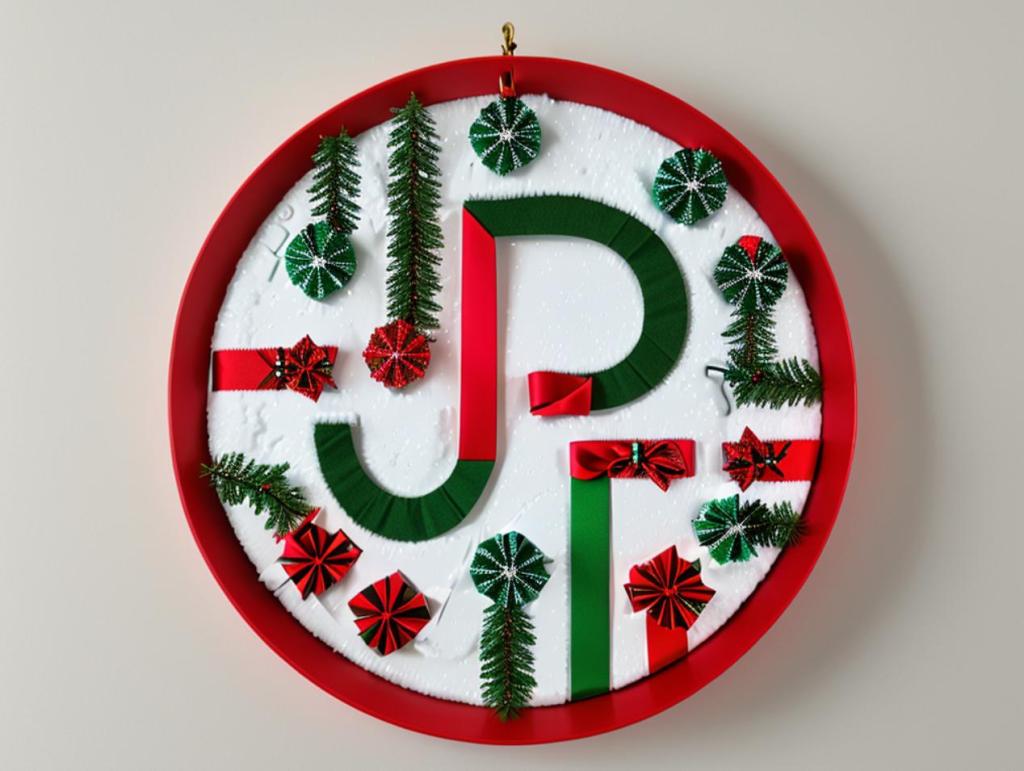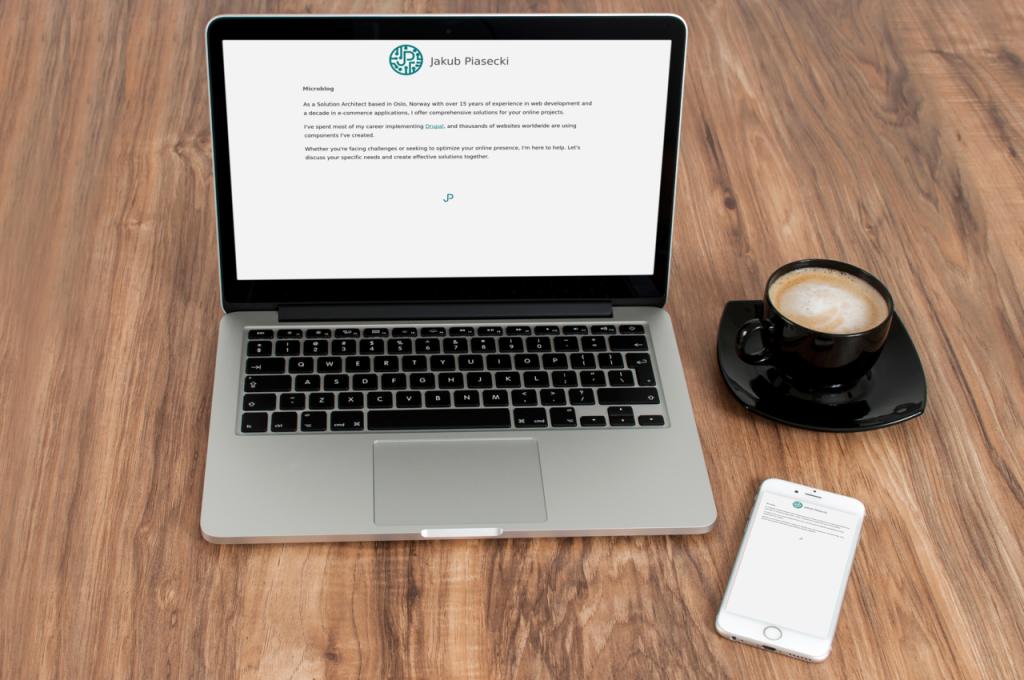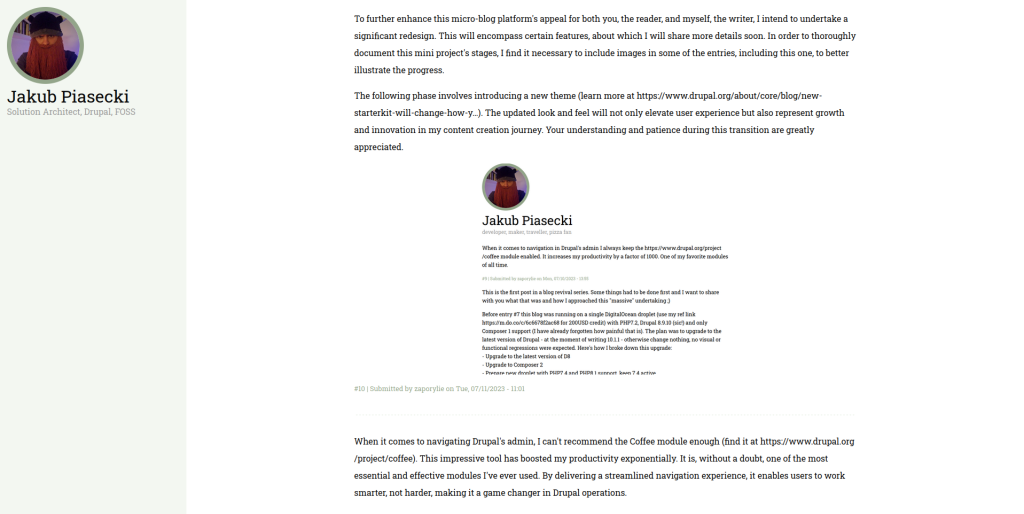This year has brought numerous changes into my life, some filled with joy, others marked by challenges, yet all were necessary. I want to express my gratitude to everyone I had the privilege of collaborating with during this year. I look forward to the possibility of our paths crossing again, whether on a Drupal project or another exciting web venture. In the meantime, I wish you all the best for this Holiday season.
Microblog
Earlier this month, I renewed my Proton (https://proton.me) account for another 2 years. It's the largest invoice I've paid this year for something I used to get "for free." However, here's why I still feel good about it.
About 4 years ago, I made the switch from Gmail to ProtonMail as my primary email inbox. Admittedly, it took a bit of time to adapt to a new email address, apps, and interface. ProtonMail isn't, and probably never will be, a direct replacement for Gmail. So, I had to adjust to a different way of working and accept the absence of some features and services.
Why did I switch? Well, for several reasons. Firstly, I no longer wanted an email address with a *@gmail.com domain. Secondly, I had concerns about depending on a single company for services, especially given the history of companies discontinuing their services (see https://killedbygoogle.com/). Lastly, privacy was a significant concern.
Sure, I could have signed up for the G Suite to have a custom domain, but that would have addressed just one of my concerns. I was aware that Proton didn't offer everything I needed at the time. The Calendar was in its Alpha stage, and there was no cloud storage product. Nevertheless, I signed up and went all in because I believed in their mission of providing "privacy and freedom first" services.
Going all-in meant subscribing to their (no longer available) Visionary plan, which covers 6 accounts in total. I only use 3 of those accounts, leaving me with 3 spare ones I pay for.
Considering everything I've mentioned so far, why am I still happy about it?
First and foremost, I believe Proton still upholds its mission. They could have taken shortcuts, compromised on security, and expanded rapidly to make more money. Instead, they are ready to defend their customers' privacy in court if needed (ref. https://www.theguardian.com/australia-news/2023/dec/15/proton-mail-foun…).
Additionally, Proton keeps expanding its service portfolio and provides me with (early) access to all these services as part of the Suite, without additional charges. So, even though I pay substantial invoices every 2 years, I see the value of the service increasing every month. Don't get me wrong – it's still a significant amount, and I may not use all the services, but (a) the price hasn't gone up in 6 years, and (b) the value has more than doubled since I first signed up. The recent launch of their Password Manager ProtonPass was a fantastic addition to the suite, and now I can't imagine living without it.
Every service is also improving at a faster pace than ever. Lately, it feels like so much is happening that I can't keep up with all the progress the team is making. They are also communicating these improvements better to a broader audience. As of now, I don't feel that the overall product quality is compromised for the sake of enhancements, and I hope it stays that way.
At the same time, I feel confident that I can switch vendors if the need ever arises. Maybe Proton doesn't live up to its promises, or I can't afford it anymore, or a better tool emerges on the market. Ironically, the ability to switch vendors and take my data with me is one of the primary reasons I plan to stick with them in the foreseeable future.
With the holiday season here, if I were to make a wish to Proton Santa, here's the list of features I'd love to see implemented next:
- https://protonmail.uservoice.com/forums/932839-proton-drive/suggestions… - to enable syncing my Drive account with this website.
- https://protonmail.uservoice.com/forums/932839-proton-drive/suggestions… - for improved data backup from my laptop.
- https://protonmail.uservoice.com/forums/284483-proton-mail/suggestions/… - for easier navigation between messages on my phone.
- https://protonmail.uservoice.com/forums/284483-proton-mail/suggestions/… - only for Android :)
In conclusion, renewing my Proton subscription for another two years was an easy decision for me. Not only does ProtonMail align with my privacy and freedom values, but the company continues to deliver on its mission. With a growing portfolio of services, frequent improvements, and a commitment to user privacy, Proton has proven to be a reliable and forward-thinking choice. As I eagerly anticipate the features on my Proton Santa wishlist, I'm confident that Proton will continue to exceed my expectations in the years to come.
If you're considering giving Proton a try, you can use this referral link https://pr.tn/ref/TWAD0XXF7DM0 to get started.
Excited to share my new Services page! It outlines collaboration opportunities, rates, and contract models for my services. Interested in retainer, fixed project, or hourly consultancy? Find all the details you need to get started. Check it out at https://piasecki.no/services and let's talk about how we can work together!
On November 1st, I started my own consulting company. This is a big step for me because I've always enjoyed helping others with their ideas. Now, I get to speak for myself and offer my services.
Because of this change, I've made some updates to my website. I'll keep posting short updates and might also start sharing longer pieces like tutorials or case studies. I also want to show you who I am as a brand. So, I've made a logo, picked some colors, and changed my homepage to reflect this.
Remember, nothing is final. The website will change over time. But I want to be open about what's happening with me and what's next for the website. Thanks for your support, and I'm excited to share more with you.
Wrapping up an amazing websummit experience!
This was my first time attending, and I didn't know what to expect. But let me tell you, it exceeded all my expectations. The 4-day conference, including an opening night show, was jam-packed with fascinating sessions, panels, and Q&As. And if you prefer interactive learning, the expo area had 5 spacious pavilions filled with intriguing startups, scale-ups, unicorns, and regional booths. Plus, the delicious food trucks and sunny Portuguese weather made everything even better.
Coming in with some prejudices from past experiences in the tech industry, I thought I'd have to dig deep to find interesting content beyond the business metrics. Boy, was I wrong! The main focus, aside from the dominant theme of AI, revolved around privacy, sustainability, governance, security, and the human side of tech - topics close to my heart. It was inspiring to see discussions tackling poverty, inequality, health, accessibility, and internet access disparities.
Attending a conference solo for the first time since starting my consulting business this month, I wasn't sure how I'd fit into the crowd of 70k+ people, many of whom came with their work buddies. But from day 1, I felt a strong connection with this diverse crowd. Networking was a breeze, and I made valuable contacts through LinkedIn and the conference app.
Speaking of the app, I had read blog posts from previous editions of Websummit and knew that recordings from the central stage would be accessible even after the conference. So, I planned to attend smaller lectures in person and catch up on the central stage sessions later. However, I often found myself torn between multiple interesting sessions happening simultaneously. Luckily, most of them are available on the app, and I've already started watching the ones I missed live. The professionalism of the production team in organizing the conference was top-notch.
I feel incredibly fortunate to have secured a conference ticket through Websummit's developer program and my open-source contributions. Thank you, Websummit! 🙌 If you're like me, I highly recommend trying to get a ticket through the developer program next year (here's the info: https://lnkd.in/dKrtSEwh) and experiencing it for yourself. In the coming days, I'll share more detailed insights on trends and market predictions based on the lectures I watched. In the meantime, have a fantastic Sunday!
Excited to join Websummit this year with over 70k people passionate about tech! I am thrilled about how diverse the speaker lineup is. I am looking forward to meeting new people and old friends and learning about new technologies and perspectives. I am thrilled that drupal, with whom I feel connected the most throughout my professional career, is also joining and will have a booth in the expo area.
I am excited that DrupalGovCon is sold out with a stunning 600 attendees.
I wish we had an event of a similar scope here in Europe. While every governmental project is unique there's always room for the transfer of knowledge, ideas, or wishes.
As Joey Tribbiani once said 😉
"(...) through this having and giving and sharing and receiving, we too can share and love and have and receive."
In each of the European states, we have tons of projects that we as tax-payers have founded over decades. Looking at many projects I personally participated in we can greatly improve how we collaborate.
-
Rather than starting each project with a blank page we could start to accept the knowledge others already gathered. opensource can be a fantastic start for most projects. As a Drupal community, we already have plenty of talks, case studies, or even code distributions you can learn from - either from your local market or other European states.
-
Provide small but meaningful improvements. Maybe an inherited project doesn't fit the bill straight away and approaches things differently than what your project requires. Rather than complaining about that try to understand what was the reason someone approached it differently than you. Ask questions, and provide feedback. Finally, treat what you've received with tender loving care.
-
Share your incremental improvements with others. This is perhaps the most important step of the cycle as it enables one to keep iterating over and over. You will be surprised how often your past work not only impacts your future projects but can also positively impact the projects of others.
Meanwhile, I wish a fantastic conference to everyone coming to Bethesda this year.
A recent shift in Klarna's protocol since July, confirmed by a company representative, has led to significant discrepancies in the payment process. When customers choose the unbranded Klarna option (marked with a generic credit card icon), the company executes Authorization Holds for each payment attempt, regardless of whether the merchant approves or denies the order.
Furthermore, Klarna immediately completes charges for these Authorization Holds, which makes it possible for customers to initiate a Chargeback against merchants, even in cases where goods are not delivered or still in transit.
These actions challenge the guidelines established by Forbrukertilsynet, Norway's Consumer Authority*. Klarna, operating on behalf of merchants, concludes the charge and settles customers' funds in their own accounts, even when an order isn't approved by the merchant nor can be controlled by the merchant.
This new policy could introduce several complications for merchants:
- Limited Sales Opportunities: Customers may need to wait for as long as five business days to receive a refund for funds reserved by Klarna, inhibiting further purchases.
- Compliance with Consumer Authority Guidelines: Merchants must fulfill specific conditions to be allowed to take advanced payments.
- Potential Complications with Card Issuers: A higher frequency of chargebacks could result in additional chargeback fees and increased card fees for merchants.
This is quite an interesting discovery so I am raising it here for your awareness.
Customers paying with hashtag#Klarna are charged even when the merchant denied the purchase using Klarna's own validation callback, leading to a charge with no order being created. Moreover, each payment attempt results in a charge and the merchant has no means to void/refund them.
Has anyone ever felt that huge sense of accomplishment when a trivial yet tricky project starts to take shape? That's me right now!
So, here's the latest. I've managed to create a new theme based on the 'starterkit' to finally wave goodbye to our dependency on that 'classy' theme, which is not compatible with Drupal 10.x. One task off the list, eh?
But hey, that prompted an overhaul of the layout as well. I've moved from a single-column structure to a snazzier sidebar layout. While doing so I stumbled across this gem -- https://every-layout.dev/layouts/sidebar/ -- and it was a total game-changer for this makeover. Pass this on, it's a great find!
Last but not least, I've added support for. This will help structure the content of this microblog in a streamlined way, which is perfect since I am planning to cover such a wide range of topics.
Slowly but steadily, the puzzle pieces are coming together. Below snapshot of the current state of things.






